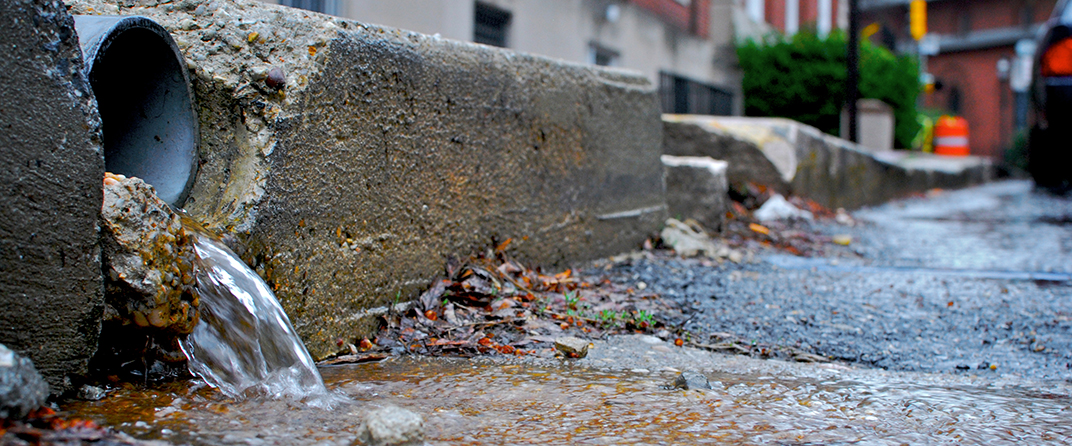Expensive Uncertainty: Cutting Stormwater Funding is a Mistake
 [Note: This guest blog post was written by Liam O’Meara, General Manager at Environmental Quality Resources (EQR). EQR is one of Blue Water Baltimore’s partners in implementing stormwater projects.]
[Note: This guest blog post was written by Liam O’Meara, General Manager at Environmental Quality Resources (EQR). EQR is one of Blue Water Baltimore’s partners in implementing stormwater projects.]
We’ve all heard plenty about Maryland’s stormwater program and the ever-present stormwater fee debate. As the rhetoric heats up this legislative season I want to bring a new voice to the discussion: that of the contractors who do the watershed restoration and infrastructure improvements necessary to meet very strict federal Clean Water Act permits.
A consistent and continuous approach is necessary to achieve our regional environmental goals. The reality is that consistent and transparent funding is cheaper in the long run for our communities than staggered and inconsistent support.
In our struggle to restore a healthy Chesapeake Bay, the quantity of work we do means nothing without consistent and high quality programs to get it done.
A Contractor’s Perspective
As the General Manager of Environmental Quality Resources (EQR), a local green infrastructure contractor, I’ve been fortunate to implement many of the watershed improvement projects funded by our local governments as part of the greater effort to clean up the Chesapeake Bay.
EQR has been in business for 25 years but the recent growth of Maryland’s Stormwater Management Program has been very exciting to us as we’ve seen more great projects develop and seen our industry grow to meet the demand for qualified specialty contractors.
Hundreds of fantastic projects are built in our region each year: creating habitat, restoring healthy stream conditions, and reducing nitrogen and phosphorus pollution. Thanks to efforts from groups like Blue Water Baltimore, the region is making great strides in advancing our environmental health, and the movement has been steadily picking up steam.
Recently, though, local politics has hijacked this momentum and the result is not good for our communities or for the health of the waters we depend on.
The Local Economic Footprint
Water quality projects are complex and difficult, often taking place in environmentally sensitive areas and demanding a highly trained, and experienced workforce.
To meet this challenge, local businesses like EQR regularly make huge investments in training and equipping our personnel so that we can provide construction crews capable of doing such challenging work well. EQR employs more than two hundred restoration experts and we contract with dozens of local businesses for services and materials.
These are good jobs, and the work is arduous but rewarding, especially when our employees work in their own communities, as is often the case.
Moreover the economic ripple effect of restoration work in Maryland is huge. The footprint includes not only contractors like EQR, but also our local engineers, surveyors, consultants, mechanics, quarries, soil producers, plant nurseries, pipe producers, trucking companies, bankers, brokers, equipment companies, and more.
The nature of the work means investments in green infrastructure stay almost entirely local and they create significant economic value beyond the benefit of the improvements themselves.
Why Cutting Fees is Expensive
The pushback on the stormwater fee in many jurisdictions has put program funding in jeopardy and slowed the pace of work. The most recent and regrettable example is in Baltimore County, where the County Council took a funded and flourishing stormwater program, run by a competent and experienced department, and eviscerated it for political gain.
By doing so they’ve set back environmental progress in their jurisdictions tremendously, created a gap in the flow of project completion, and introduced uncertainty into the industry.
Most glaringly, there are ongoing contracts in place with below-market pricing. As a result of the current freeze on new work, these contracts will expire underutilized and be re-bid at higher rates, thus costing county taxpayers more for the same exact work, and delaying the benefits of long-overdue restoration. Ironically, it turns out that this was a very expensive “cost saving” measure.
In addition, by eliminating the stormwater fee and proclaiming victory, the council forced this federally mandated work into the general fund where it will draw money away from crucial county services such as fire, police, schools, and public works.
Instead of having the polluters fund the cleanup efforts as the fee system did, the new structure spreads the costs across all citizens regardless of how much pollution they create. This is not a fair allocation and it is likely that the average taxpayer in Baltimore County will end up paying more in the end than under the fee system.
Furthermore, the constant interruption of workflow keeps contractors, engineers, and agencies from investing in a better workforce.
A real consequence of this effect is a less skilled workforce, which leads to more expense and lower value to citizens in the long run.
Uncertainty is expensive, and eliminating the stormwater fee will prove very costly for Baltimore County in the long run. The fallout from this will last a long time. The actions of the county council will have real, lasting, and harmful consequences to their own constituents. This is nothing to be proud of.
Let’s Not Repeat Mistakes
The challenge now is to make sure Baltimore County’s misstep is not repeated in other areas.
Howard County currently has legislation pending to cut their stormwater fee, and I’m sure a similar bill will be introduced in Anne Arundel. It would be a major setback to watershed cleanup efforts in general if either succeeds.
As a contractor, I’d obviously be disappointed, but as a citizen, taxpayer, and stormwater fee payer, I’d be devastated to see this happen.
As opposition to stormwater fees erodes the effectiveness of our collective restoration efforts, keep the local economic impact of what we do in mind. Please support the economic vitality and environmental health of our community by helping local advocacy groups such as Blue Water Baltimore fight this very expensive political grandstanding.


